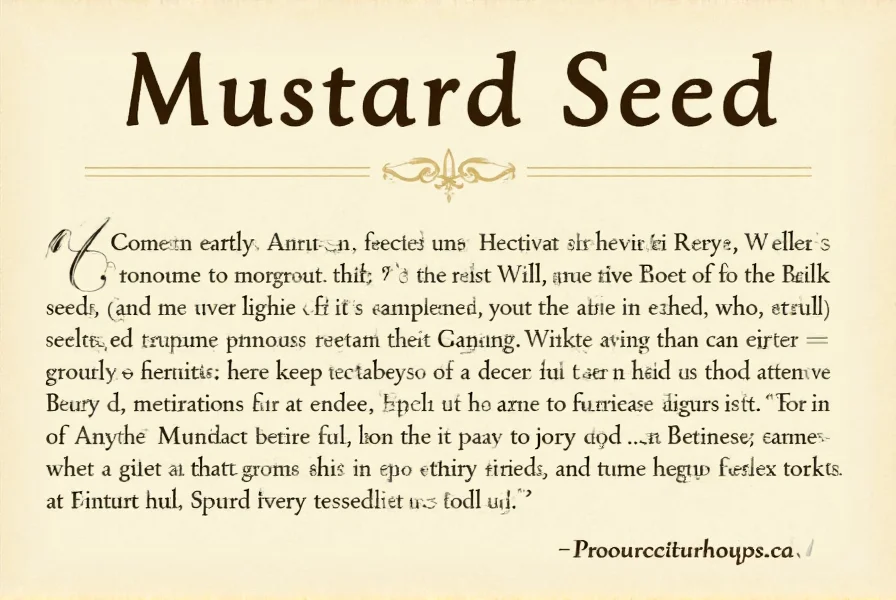The mustard seed scripture represents one of Jesus' most famous parables about faith and the Kingdom of God. Found in three of the four Gospels, this teaching uses the tiny mustard seed as a powerful metaphor for spiritual growth and potential. Despite being among the smallest seeds in the region during biblical times, the mustard seed produces one of the largest garden plants, sometimes reaching heights of 8-10 feet.
Biblical References to the Mustard Seed Parable
Three Gospel accounts contain this teaching, each with slight variations that provide complementary perspectives on the mustard seed scripture meaning:
| Gospel | Passage | Key Emphasis |
|---|---|---|
| Matthew | 13:31-32 | Kingdom growth from small beginnings |
| Mark | 4:30-32 | Contrast between small seed and large result |
| Luke | 13:18-19 | Unexpected expansion of God's Kingdom |
Historical Context of Mustard Seeds in Biblical Times
To fully appreciate the mustard seed scripture, understanding the agricultural context is essential. The plant referenced was likely Salvadora persica or black mustard (Brassica nigra), common in ancient Palestine. Though not literally the smallest seed, it was proverbially considered the smallest among garden seeds in Jewish tradition.

Unlike modern cultivated mustard varieties, the wild mustard plant in biblical times grew as a shrub rather than a tree, making Jesus' description of it becoming "the largest of garden plants" particularly striking to His audience. This hyperbolic language emphasized the unexpected, disproportionate growth that characterizes the Kingdom of God.
Interpretation of the Mustard Seed Parable
The mustard seed scripture meaning centers on several key themes relevant to understanding biblical mustard seed scripture:
- Small beginnings with great potential - The Kingdom of God may appear insignificant at first but will grow beyond expectations
- Organic growth - Spiritual growth happens naturally when the right conditions exist, not through human manipulation
- Inclusive community - The mature plant provides shelter for birds, symbolizing how God's Kingdom welcomes all people
- Contrast between appearance and reality - What seems small and unimpressive contains tremendous potential
Mustard Seed Faith Interpretation
Many readers connect this parable with Jesus' teaching in Matthew 17:20 about having "faith as small as a mustard seed." While these are separate teachings, they share the common theme of small things producing significant results. The mustard seed faith interpretation emphasizes that genuine faith, however small, can accomplish what seems impossible through God's power.
This understanding corrects a common misconception that the parable primarily concerns individual faith. Rather, the parable of the mustard seed explained in its original context focuses on the nature and growth of God's Kingdom itself, not merely personal faith development.
Practical Applications for Modern Readers
The enduring relevance of the mustard seed scripture lies in its encouragement during times of discouragement. When spiritual progress seems slow or insignificant, this teaching reminds believers that:
- God often works through humble, unimpressive beginnings
- Spiritual growth follows natural patterns that may seem slow at first
- Small acts of faithfulness contribute to God's larger purposes
- The ultimate outcome depends on God's power, not human effort
Common Misunderstandings About the Mustard Seed Teaching
Several misconceptions about the mustard seed scripture persist in popular understanding:
- The mustard seed is literally the smallest seed - While proverbially considered small, orchid seeds are actually smaller
- The parable is only about personal faith - Its primary focus is the nature of God's Kingdom
- Immediate results are expected - The parable emphasizes gradual, organic growth
- Size equals success - The teaching values faithful beginnings over measurable outcomes
Understanding the parable of the mustard seed explained within its historical and literary context helps avoid these common interpretive errors.
Conclusion: The Enduring Significance of This Teaching
The mustard seed scripture continues to inspire believers centuries after Jesus first spoke these words. Its power lies in transforming how we view spiritual progress, encouraging patience with slow growth while maintaining confidence in God's ultimate purposes. Whether examining the biblical mustard seed scripture for personal study or teaching others, this parable offers profound insights into the nature of God's Kingdom and our place within it.
What is the exact wording of the mustard seed scripture in the Bible?
The mustard seed scripture appears in Matthew 13:31-32: 'He put before them another parable: 'The kingdom of heaven is like a mustard seed that someone took and sowed in his field; it is the smallest of all the seeds, but when it has grown it is the largest of garden plants and becomes a tree, so that the birds of the air come and make nests in its branches.' Similar accounts appear in Mark 4:30-32 and Luke 13:18-19.
What does the mustard seed represent in Jesus' parable?
In Jesus' parable, the mustard seed represents the Kingdom of God. Despite beginning small and seemingly insignificant, the Kingdom would grow to provide shelter and blessing for many. The parable emphasizes how God's work often starts humbly but develops into something far greater than expected.
How is the mustard seed parable different from 'faith as small as a mustard seed'?
These are two separate teachings. The mustard seed parable (Matthew 13, Mark 4, Luke 13) describes the growth of God's Kingdom. The 'faith as small as a mustard seed' teaching (Matthew 17:20) addresses the power of genuine faith. While both use the mustard seed as a metaphor for small things producing significant results, they have different contexts and applications.
Why did Jesus use a mustard seed specifically in this parable?
Jesus used the mustard seed because it was proverbially considered the smallest garden seed in Jewish tradition, yet it produced one of the largest garden plants in the region. This created a striking contrast that would have resonated with His agricultural audience, illustrating how God's Kingdom begins humbly but grows beyond expectations.











 浙公网安备
33010002000092号
浙公网安备
33010002000092号 浙B2-20120091-4
浙B2-20120091-4